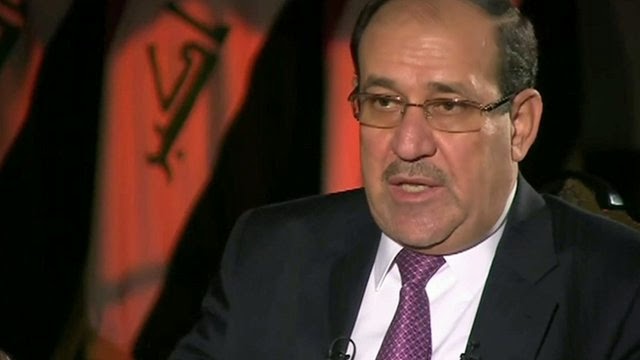
Grand Ayatollah Sistani is seen as an influential leader among Iraq's Shia community
Iraq's most influential Shia cleric has called for a prime minister to be appointed before Tuesday in a bid to defuse the country's political crisis.
Grand Ayatollah Sistani told said that key positions should be agreed before the new parliament meets on Tuesday.
Pressure has been building both inside and outside Iraq for a national unity government but political blocs have been unable to reach a deal.
Large parts of Iraq were seized by Sunni militants earlier this month.
Mr Sistani, who was born in Iran, relayed the message to his followers through a Friday sermon delivered by a spokesman.
He called for political parties, including the State of Law Coalition of current prime minister Nouri Al-Maliki, to also appoint a new speaker and president for the country.
"What is required of the political blocs is to agree on the three presidencies within the remaining days to this date," the sermon said.
The Grand Ayatollah's representative spoke to the BBC last week
Ayatollah Sistani's intervention is hugely important.
At the moment, there is no agreement on who should lead the new government, or fill the other top jobs. After the 2010 elections, it took nine months for the political blocs to reach agreement.
Now, the Ayatolah's asking them to do it in just three days. The key question is who will be the new prime minister.
Nouri al-Maliki is insisting on a third term. His coalition came out first in the April election, but far short of having a majority.
But his potential partners are few. He's seen by many as having precipitated the crisis, by monopolising power and marginalising the Sunnis.
There are plenty of other potential candidates among the Shia parties, who as the overall majority have the right to choose a nominee.
Left to their own devices the blocs could have haggled on for months, leaving Mr Maliki in power.
But the Ayatollah's intervention greatly increases the pressure for a speedy solution, indicating that both he, and perhaps Iran, which is immensely influential among the Shia, believe the level of threat requires immediate action, and probably the removal of Mr Maliki.
Earlier this month Mr Sistani called for Iraqis to take up arms against militants from Isis - the Islamic State in Iraq and the Levant.
Kurdish rule 'achieved'
Mr Maliki has so far rejected calls to create an emergency coalition which would include all religious and ethnic groups. He wants to continue as prime minister for a third term.
He said on Wednesday that forming a broad emergency government would go against the results of April's parliamentary elections, which were won by his alliance of Shia parties.
Iraq's Prime Minister Nouri Maliki talks to the BBC
His political rival, Ayad Allawi, had proposed forming a national salvation government.
Meanwhile, Masoud Barzani, leader of Iraqi Kurdistan, said that Kurdish self-rule in Kirkuk had been "achieved".
The oil-rich city fell into the hands of Kurdish fighters when Iraqi troops fled in the face of the Islamist advance.
The government has struggled to hold back the militants' advance from the north and west.
Families have continued to flee some villages in Nineveh province to try to get to Irbil
Meanwhile, the charity Save the Children has warned that thousands of families are continuing to flee fighting in Nineveh province.
Several Christian villages have been attacked, the charity said, causing families to leave without any belongings.
"Hundreds of thousands of children have been forced to flee with their families to escape the violence in the north and west of the country", warned the charity's country director in Iraq, Tina Yu.
"We also should not forget that there are already a quarter of a million Syrian refugees in the Kurdistan region of Iraq", she added.















0 comments:
Post a Comment